
When it comes to Excel, here’s a good rule of thumb: If you start to do something manually, it probably means there is an easier way to do it. Whether you are trying to remove duplicates, do simple calculations, or sort your data, you can almost always find a workaround that’ll help you get it done with just a click (or two) of a button.
But if you’re not a power user, it’s easy to overlook these shortcuts. And before you know it, something as simple as organizing a list of names in alphabetical order can suck up a ton of your time.
Luckily, there is a workaround for that. In fact, there are a few different ways to use Excel’s sorting feature that you may not know about. Let’s check them out below …
How to Sort in Excel: 5 Useful Options
1) Sorting from A to Z
Let’s start out with the basics. Sometimes you may have a list of data that has no organization whatsoever. Maybe you exported a list of your marketing contacts or blog posts. Whatever the case may be, you might want to start by alphabetizing the list.
To do this on a Mac:
- Click on the data in the column you want to sort.
- Click on the “Data” tab in your toolbar and look for the “Sort” option on the left.
- If the “A” is on top of the “Z,” you can just click on that button once. If the “Z” is on top of the “A,” click on the button twice. Note: When the “A” is on top of the “Z,” that means your list will be sorted in alphabetical order. However, when the “Z” is on top of the “A,” that means your list will be sorted in reverse alphabetical order.
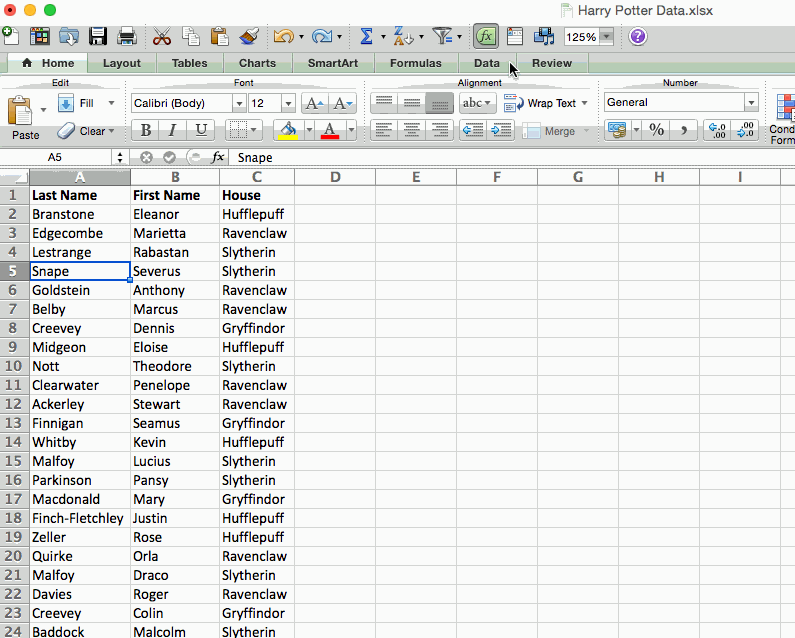
To do this on a PC:
- Click on the data in the column you want to sort.
- Click on the “Data” tab in your toolbar. You will see Sort options in the middle.
- Click on the icon above the word “Sort.” A pop-up will appear: If you have headers, make sure “My list has headers” is checked. If it is, click “Cancel.”
- Click on the button that has the “A” on top and the “Z” on the bottom with an arrow pointing down. That will sort your list alphabetically from “A” to “Z.” If you want to sort your list in reverse alphabetical order, click on the button that has the “Z” on top and the “A” on the bottom.
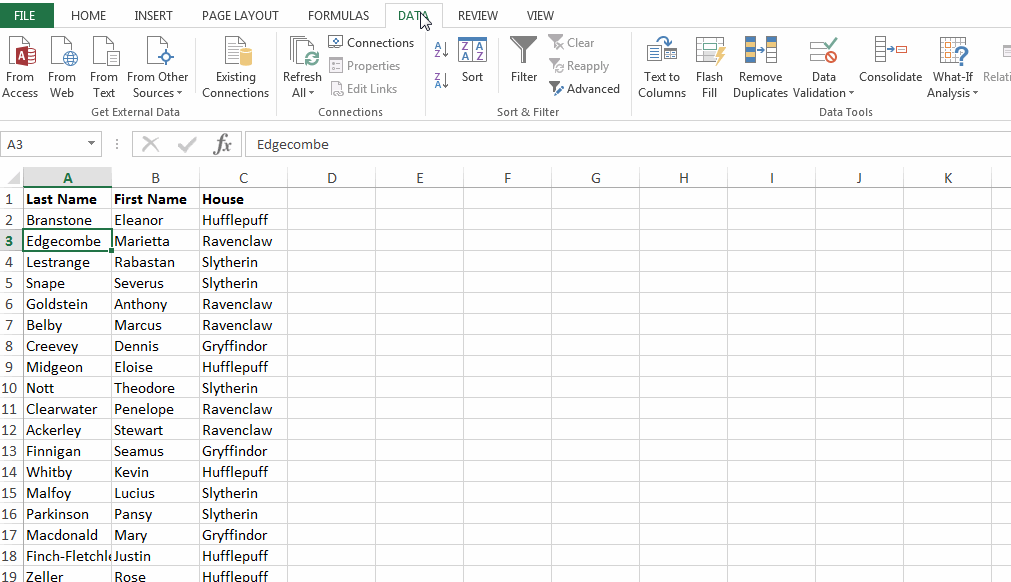
2) Sorting Multiple Columns
Sometimes you don’t just want to sort one column, but you want to sort two. Let’s say you want to organize all of your blog posts that you have in a list by the month they were published. First, you’d want to organize them by date, and then by the blog post title or URL.
In this example, I want to sort my list first by house, and then by last name. This would give me a list organized by each house, but also alphabetized within each house.
To do this on a Mac:
- Click on the data in the column you want to sort.
- Click on the “Data” tab in your toolbar and look for the “Sort” option on the left.
- Click on the small arrow to the left of the “A to Z” Sort icon. Then, select “Custom Sort” from the menu.
- A pop-up will appear: If you have headers, make sure “My list has headers” is checked.
- You will see five columns. Under “Column” select the first column you want to sort from the dropdown menu. (In this case, it is “House.”)
- Then, click on the “+” sign at the bottom left of the pop-up. Under where it says “Column,” select “Last Name” from the dropdown.
- Check the “Order” column to make sure it says A to Z. Then click “OK.”
- Marvel at your beautiful organized list.
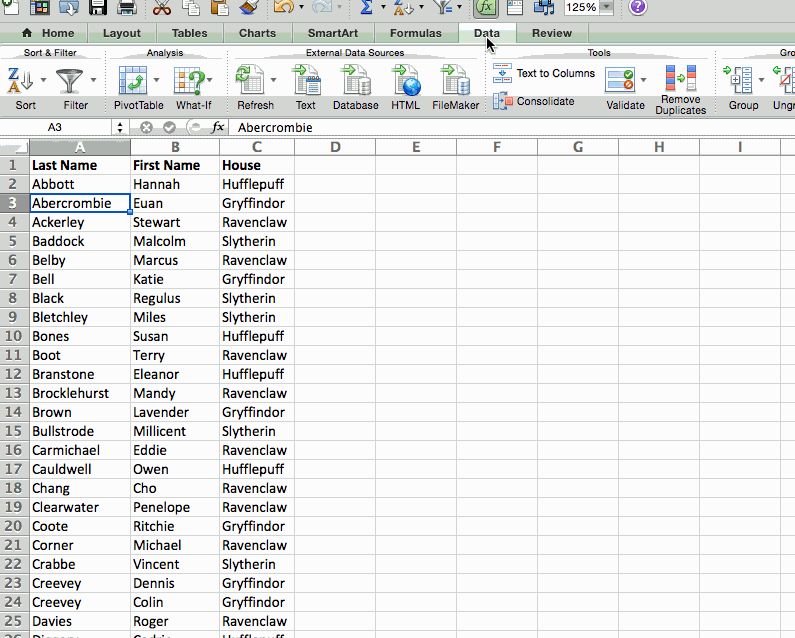
To do this on a PC:
- Click on the data in the column you want to sort.
- Click on the “Data” tab in your toolbar. You will see “Sort” options in the middle.
- Click on the icon above the word “Sort.” You will see a pop-up appear. Make sure “My data has headers” is checked if you have column headers.
- You will see three columns. Under “Column” select the first column you want to sort from the dropdown menu. (In this case, it is “House.”)
- Then click on “Add Level” at the top left of the pop-up. Under where it says “Column” select “Last Name” from the dropdown.
- Check the “Order” column to make sure it says A to Z. Then click “OK.”
- Marvel at your beautiful organized list.
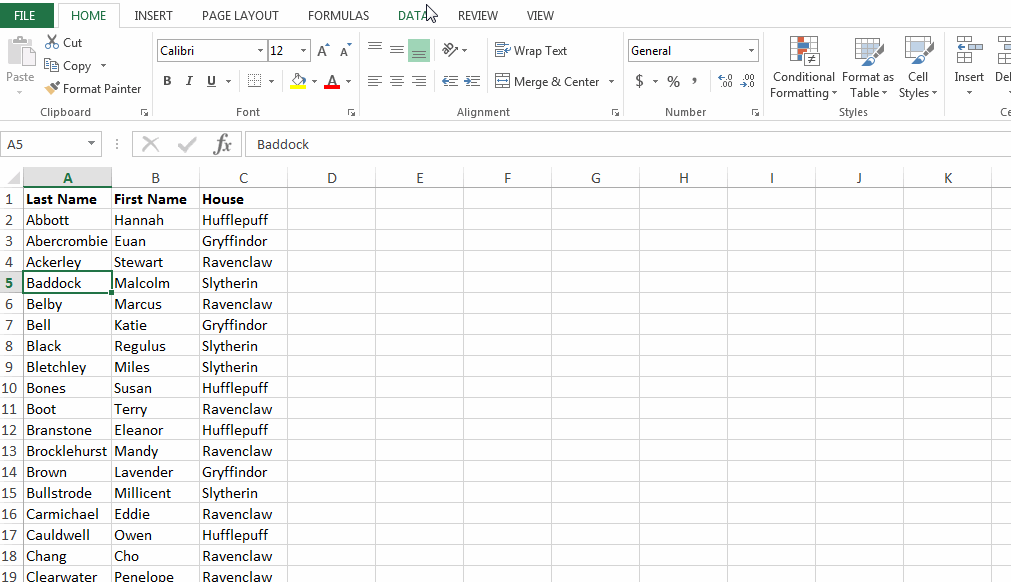
3) Sorting in Custom Order
Sometimes you don’t want to sort by A to Z or Z to A. Sometimes you want to sort by something else such as months, days of the week, or some other organizational system.
In situations like this you can create your own custom order to specify exactly the order you want the sort. (It follows a similar path to multiple columns but is slightly different.)
Let’s say we have everyone’s birthday month at Hogwarts, and we want everyone to be sorted first by Birthday Month, then by House, and then by Last Name.
To do this on a Mac:
- Click on the data in the column you want to sort.
- Click on the “Data” tab in your toolbar. You will see “Sort” all the way to the left.
- Click on the small arrow to the left of the “A to Z” Sort icon. Then, select “Custom Sort” from the menu.
- A pop-up will appear: If you have headers, make sure “My list has headers” is checked.
- You will see five columns. Under “Column,” select the first column in your spreadsheet you want to sort from the dropdown menu. In this case, it is “Birthday Month.”
- Under the “Order” column, click on the dropdown next to “A to Z.” Select the option for “Custom List.”
- You will see a couple of options (month and day). Select the month list where the months are spelled out, as that matches the data. Click “OK.”
- Then click on the “+” sign at the bottom left of the pop-up. Under “Column,” select “House” from the dropdown.
- Click on the “+” sign at the bottom left again. Under “Column,” select “Last Name” from the dropdown.
- Check the “Order” column to make sure “House” and “Last Name” say A to Z. Then click “OK.”
- Marvel at your beautiful organized list.
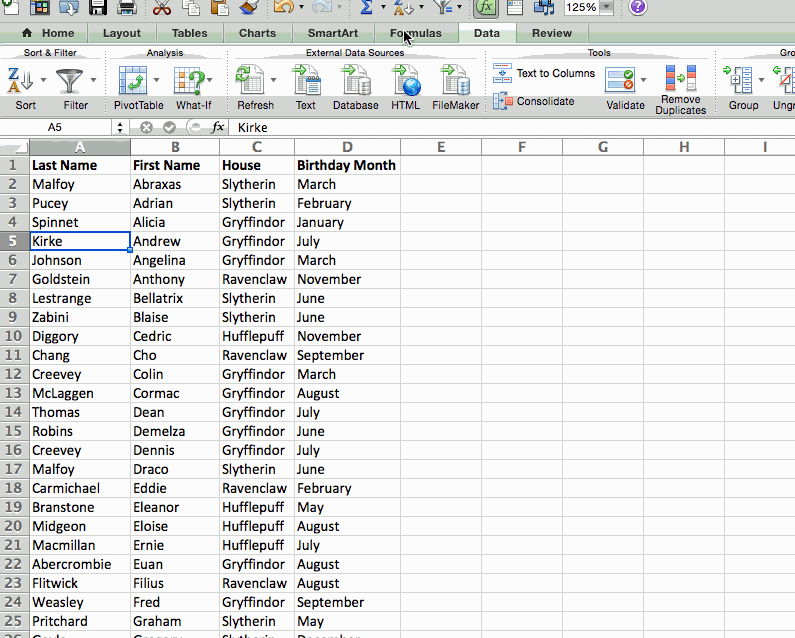
To do this on a PC:
- Click on the data in the column you want to sort.
- Click on the “Data” tab in your toolbar. You will see “Sort” options in the middle.
- Click on the icon above the word “Sort.” You will see a pop-up appear: If you have headers, make sure “My list has headers” is checked.
- You will see three columns. Under “Column,” select the first column you want to sort from the dropdown. In this case, it is “Birthday Month.”
- Under the “Order” column, click on the dropdown next to “A to Z.” Select the option for “Custom List.”
- You will see a couple of options (month and day), as well as the option to create your own custom order. Select the month list where the months are spelled out, as that matches the data. Click “OK.”
- Then, click on “Add Level” at the top left of the pop-up. Under “Column,” select “House” from the dropdown.
- Click on the “Add Level” button at the top left of the pop-up again. Under “Column,” select “Last Name” from the dropdown.
- Check the “Order” column to make sure “House” and “Last Name” say A to Z. Then click “OK.”
- Marvel at your beautiful organized list.
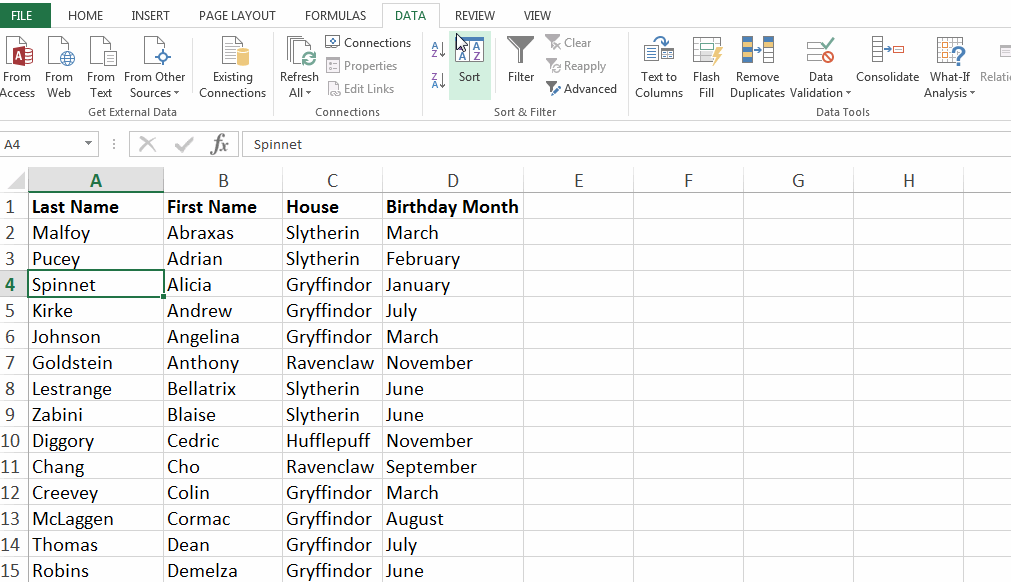
4) Sorting a Row
Sometimes your data may appear in rows instead of columns. When that happens you are still able to sort your data with a slightly different step.
To do this on a Mac:
- Click on the data in the row you want to sort.
- Click on the “Data” tab in your toolbar. You will see “Sort” all the way to the left.
- Click on the small arrow to the left of the “A to Z” Sort icon. Then, select “Custom Sort” from the menu.
- A pop-up will appear: Click on “Options” at the bottom.
- Under “Orientation” select “Sort left to right.” Then, click “OK.”
- You will see five columns. Under “Row,” select the row number that you want to sort from the dropdown. (In this case, it is Row 1.) When you are done, click “OK.”
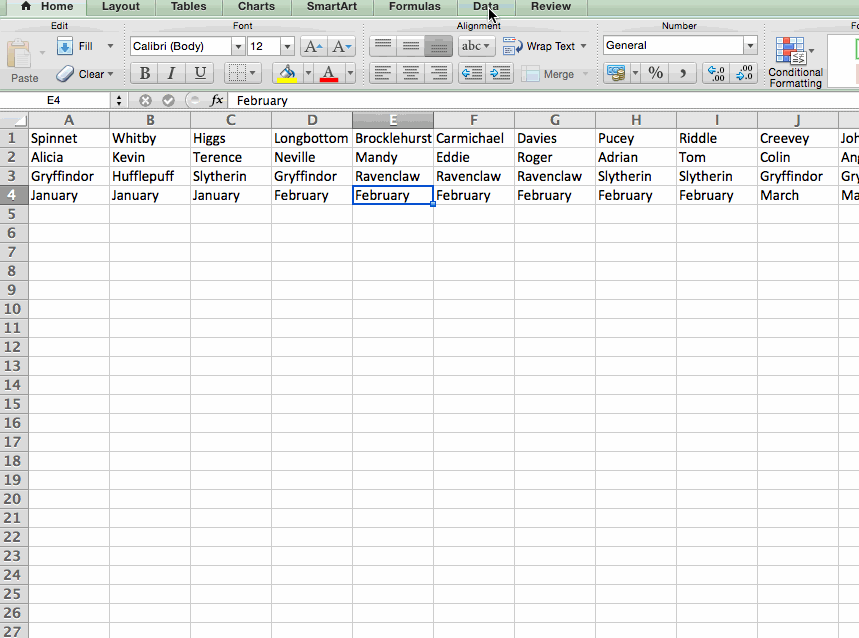
To do this on a PC:
- Click on the data in the row you want to sort.
- Click on the “Data” tab in your toolbar. You will see “Sort” options in the middle.
- Click on the icon above the word “Sort.” You will see a pop-up appear.
- Click on “Options” at the bottom.
- Under “Orientation” select “Sort left to right.” Then, click “OK.”
- You will see three columns. Under “Row,” select the row number that you want to sort from the dropdown. (In this case, it is Row 1.) When you are done, click “OK.”
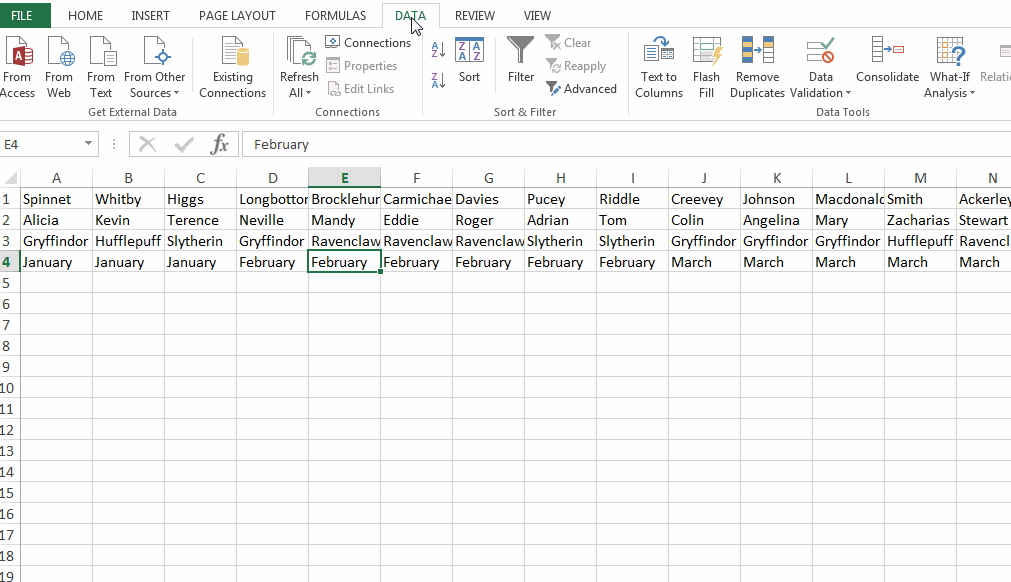
5) Sort Your Conditional Formatting
If you use conditional formatting to change the color of a cell, add an icon, or change the color of a font, you can actually sort by that, too.
In the example below, I’ve used colors to signify different grade ranges: If they have a 90 or above, the cell appears green. Between 80-90 is yellow. Below 80 is red. Here’s how you’d sort that information to put the top performers at the top of the list. I want to sort this information so that the top performers are at the top of the list.
To do this on a Mac:
- Click on the data in the row you want to sort.
- Click on the “Data” tab in your toolbar. You will see “Sort” all the way to the left.
- Click on the small arrow to the left of the “A to Z” Sort icon. Then, select “Custom Sort” from the menu.
- A pop-up will appear: If you have headers, make sure “My list has headers” is checked.
- You will see five columns. Under “Column,” select the first column you want to sort from the dropdown. In this case, it is “Grades.”
- Under the column that says “Sort On,” select “Cell Color”.
- In the last column that says “Color/Icon,” select the green bar.
- Then click on the “+” sign at the bottom left of the pop-up. Repeat steps 5-6. Instead of selecting green under “Color/Icon,” select the yellow bar.
- Then click on the “+” sign at the bottom left of the pop-up. Repeat steps 5-6. Instead of selecting green under “Color/Icon,” select the red bar.
- Click “OK.”
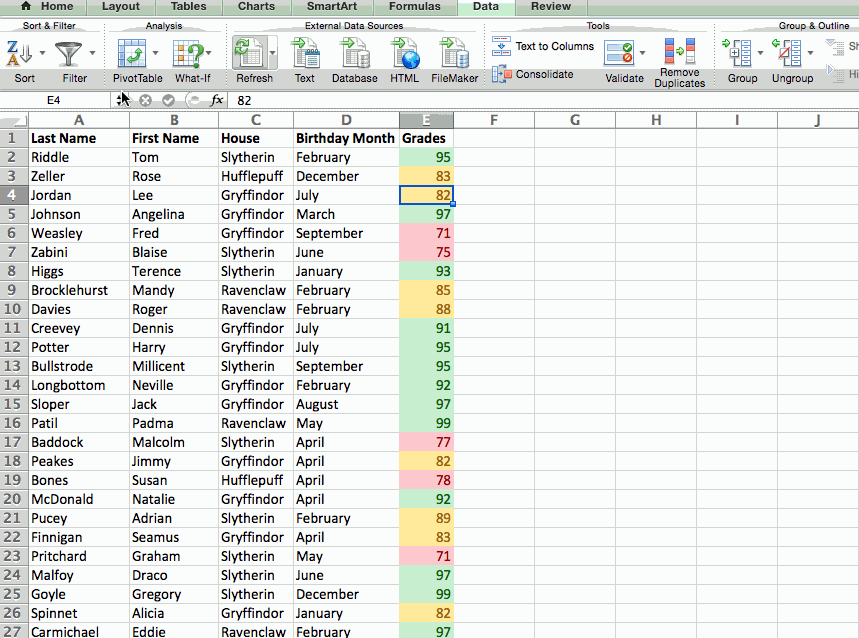
To do this on a PC:
- Click on the data in the row you want to sort.
- Click on the “Data” tab in your toolbar. You will see “Sort” options in the middle.
- Click on the icon above the word “Sort.” A pop-up will appear: If you have headers, make sure “My list has headers” is checked.
- You will see three columns. Under “Column” select the first column you want to sort from the dropdown. In this case, it is “Grades.”
- Under the column that says “Sort On,” select “Cell Color”.
- In the last column that says “Order,” select the green bar.
- Click on “Add Level.” Repeat steps 4-5. Instead of selecting green under “Order,” select the yellow bar.
- Click on “Add Level” again. Repeat steps 4-5. Instead of selecting yellow under “Order,” select the red bar.
- Click “OK.”
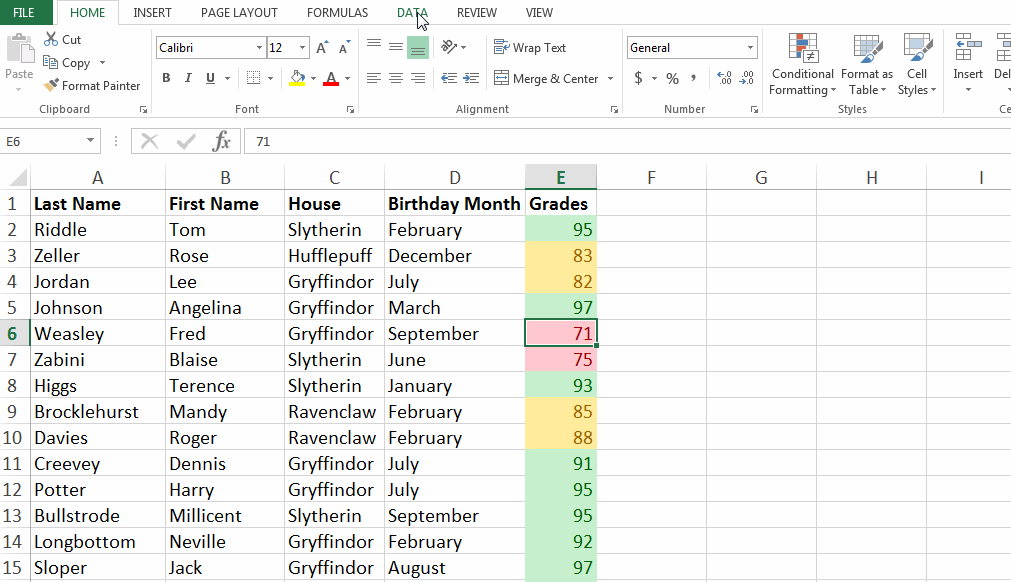
What other Excel tips and tricks do you want to learn more about? Share your ideas below.


